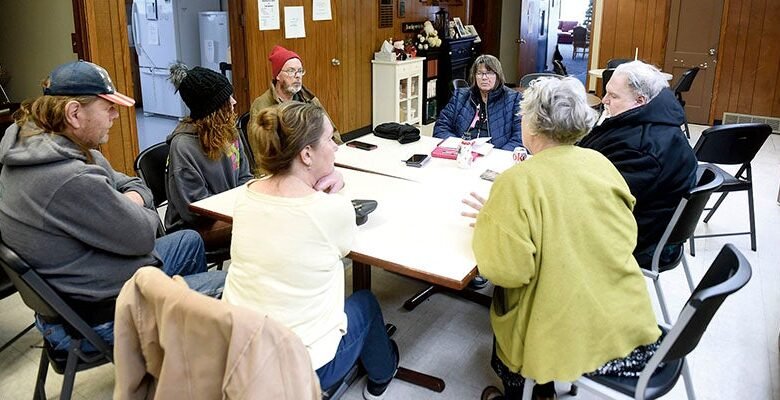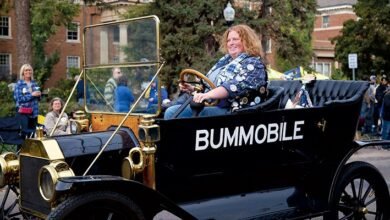Reducing the stigma: Mower County Mental Health Local Advisory Council working to bring light to mental illness – Austin Daily Herald

Reducing the stigma: Mower County Mental Health Local Advisory Council working to bring light to mental illness
Published 7:00 am Saturday, January 13, 2024
1 of 3
For those coping with or know somebody who is coping with mental illness, the challenges can run much deeper than the infliction itself.
Often it goes as deep as the stigma associated with mental health and mental illness, however, in Mower County a local group is doing what it can to not only get resources available to those who need them, but also to do their part to try and relieve the stigma that goes along with mental illness.
“What we’re trying to do is say, there is a lot out there, but there is more we could use,” said Sandy Ferrell, who helps facilitate the work of the Mower County Mental Health Advisory Council (LAC), which meets at The Bridge on the second Tuesday of every month. “We’re trying to reduce the stigma in getting mental health services. After all, who among us hasn’t been depressed? Everyone has experienced something. Sometimes the experiences are life-altering.”
The LAC, made of both advocates and those with their own stories to tell, is a dedicated effort in Mower County to help meet all facets of mental health, now one of the leading challenges being dealt with throughout the United States today.
As part of the foundation, the LAC works to pull available resources together and meet whatever needs may be out there.
“We talk about what’s available in the community that has to do with mental health issues and we talk about what might be needed,” said committee member Craig Borgesen.
The Mower LAC is one of the more long-running committees dedicated to this task, having run continuously since the mid-1990s and according to Ferrell, was born out of legislation in 1987, which required the enactment of several statutes regarding mental health services.
One of those requirements was that counties were required to form advisory councils and like many advisory committees, the LAC is largely consumer-driven, meaning those with lived mental health experiences.
That view point brought by those with lived experiences is vital to what the LAC is trying to do.
“In my mind it just makes sense because people who have experienced mental illness certainly have a perspective that others do not,” Ferrell said. “They have a unique perspective. It’s important to include others as well, but it’s notably consumer driven more so than the LACs in other counties.”
The work isn’t just centered on bringing resources and people together. Important to reducing the stigma of mental health is the willingness to advocate publicly for better mental health and those with mental illness.
The LAC plans events including the annual Mental Health Awareness Walk held in Austin each year. The walk begins at Austin Manor in town and makes its way through the community to The Bridge, where lunch is served, door prizes are handed out and a speaker is featured.
It’s a visible way to champion the cause.
“This year it’s going to be on May 18, a Saturday,” Borgesen said. “It’s a new day. We need to splash it around because for 20 years it’s been on Friday morning. It’s going to be a walk. A nice little walk.”
The hope is that by switching the event from Friday to Saturday, the walk will generate more participation and bring in people who maybe in the past couldn’t attend because of work or other commitments on Fridays.
Another part of reducing stigma is by advocating for greater education, which in turn can lead to greater understanding of the challenges surrounding mental illness.
That kind of work is another indication of how much the LAC does.
“We really strive to do several things,” Ferrell said. “One is to eliminate the stigma of having mental health issues or seeking help. As well, our group focuses on communication and education. The education includes information about services. But it can also be about other things that have an impact on who is struggling with mental health. We spend a lot of time trying to track down what’s really out here, what’s working, how well is it working? What needs do we have that aren’t being addressed?”
Above all, the LAC strives to be a welcoming environment for those who wish to be a part of the committee’s work, something it does in conjunction with The Bridge, even though The Bridge is a separate entity.
While LAC conducts work into the issue of mental health, The Bridge provides a space for socialization.
These two things together are creating an even broader foundation for the work the LAC is doing in order to continue making sure those with mental health challenges or illness aren’t being left behind.
“I really think a big part of our group is giving the message that when we work together, we can do a lot more,” Ferrell said. “When we’re talking to each other and to others we can do a lot more. That communication really helps folks who are experiencing mental illness.”
“We’re better together,” Ferrell added.
If you would like to be a part of the LAC, people are encouraged to come to a meeting on that second Tuesday of the month at noon at The Bridge (108 East Oakland Avenue). Use the east-facing door.
The walk will start at 10 a.m. on May 18, though people are encouraged to be out at Austin Manor (510 23rd Ave NW) at 9:45 a.m. People can also come to The Bridge on that day at 9:30 a.m. and be given a ride to Austin Manor.
Likewise, those who don’t want to walk the entire distance or just part of the distance, will be able to make use of shuttles that day that will allow them to still be a part of the event.
Source link






